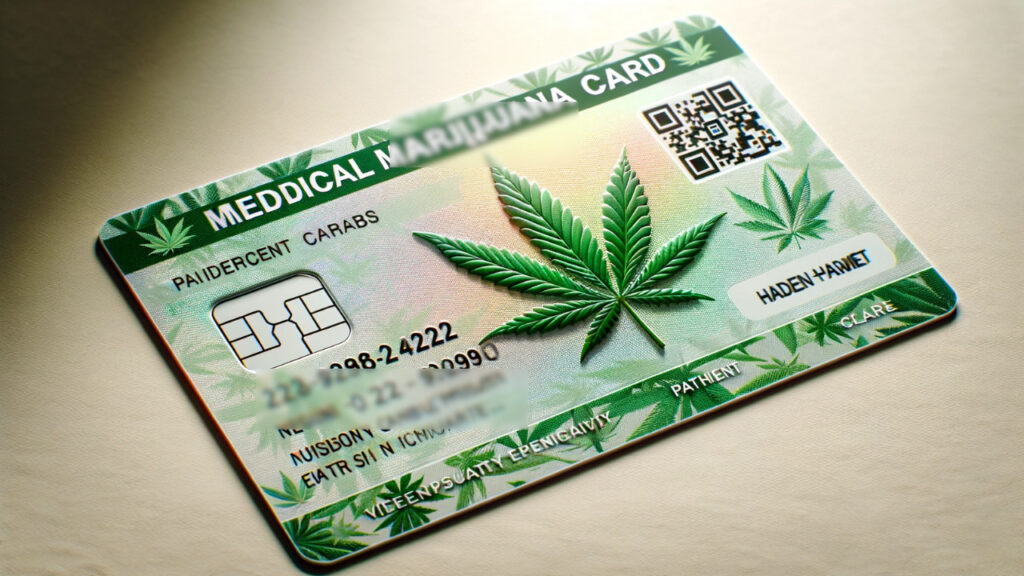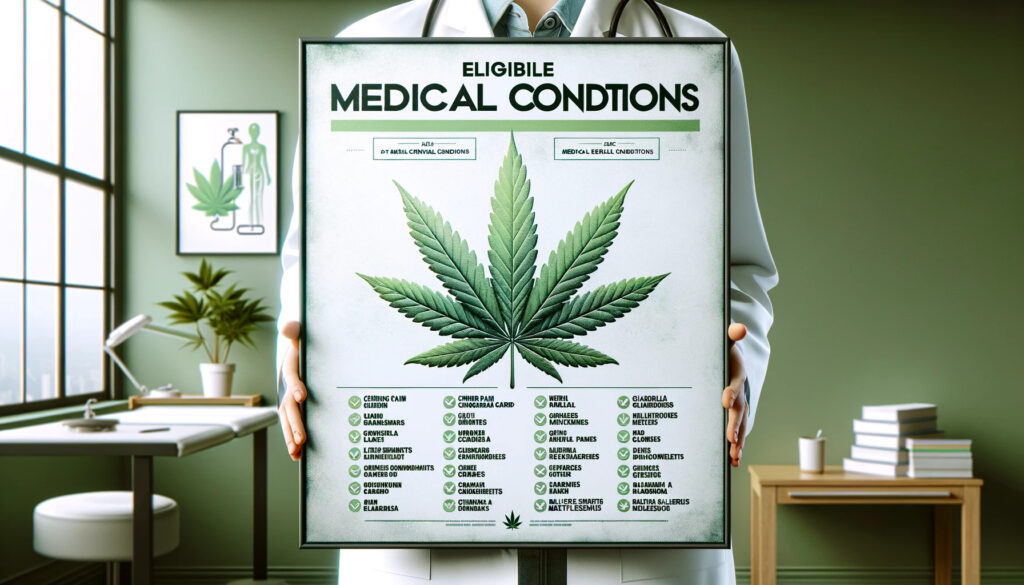Are you considering getting a medical marijuana card in Oklahoma but unsure whether it’s right for you? There are many common misconceptions about cannabis and how a medical marijuana card works, so it can be hard to know who to trust.
In this blog post, we’ll dispel the most common myths about obtaining a medical marijuana card in Oklahoma and help set your mind at ease as you consider applying. With accurate information from reputable sources that Oklahoma residents can rely on, we hope to provide clarity to those who have questions about taking advantage of this excellent opportunity.
Medical Marijuana Card

The medical marijuana card, often called a “cannabis card” or “MMJ card,” is an official document issued by the state of Oklahoma that grants individuals legal access to medical marijuana to treat qualifying medical conditions. This card serves as a gateway for patients to enter the state’s medical marijuana program, allowing them to obtain and use medical cannabis products from licensed dispensaries.
Medical Marijuana in Oklahoma: Addressing Myths and Misconceptions
As the use of medical marijuana becomes more prevalent, it’s crucial to recognize its significance and to dispel common myths and misconceptions. In the state of Oklahoma, the adoption of medical marijuana has brought both hope and apprehension. Understanding its place in healthcare and society is vital for informed decisions.
Bridging the Gap Between Patients and Relief
Medical marijuana has demonstrated its potential to relieve individuals battling various medical conditions. From chronic pain and anxiety to epilepsy and cancer, it offers a range of therapeutic benefits. However, myths suggesting that it’s only for severe or specific conditions can discourage patients who may genuinely benefit from seeking treatment through medical marijuana. By addressing these myths, we can ensure that those in need can access this form of relief.
Dismantling Stigmas Surrounding Mental Health
Another important aspect is dismantling the stigmas associated with mental health conditions. In Oklahoma, patients suffering from anxiety, depression, or post-traumatic stress disorder (PTSD) can find solace in medical marijuana. Dispelling the myth that medical marijuana is solely for physical ailments is critical, as it can improve mental health outcomes for many patients.
Emphasizing Individualized Treatment
Myths suggesting that medical marijuana is a one-size-fits-all solution are inaccurate and potentially harmful. Every patient is unique, and their response to treatment varies. By understanding that medical marijuana treatment plans are tailored to each patient’s medical condition and needs, we ensure that individuals receive personalized care, leading to better outcomes.
Collaborative Decision-Making with Healthcare Providers
Healthcare providers in Oklahoma play a pivotal role in recommending medical marijuana. It’s crucial to understand that they base their recommendations on medical assessments, scientific evidence, and clinical experience. Dispelling myths that suggest providers are uninformed or only motivated by financial gain is essential for fostering trust and collaboration between patients and healthcare professionals.
Expanding Awareness and Accessibility
One key myth is that medical marijuana is not accessible to all. We can expand awareness about the program’s inclusivity by addressing this misconception. Patients from various backgrounds and with different medical conditions can benefit, and misunderstandings should not hinder accessibility.
Medical marijuana has a legitimate place in Oklahoma’s healthcare landscape. Addressing myths and misconceptions surrounding its use is essential for ensuring patients receive the necessary treatment.
Debunking Myths About Eligible Medical Conditions for a Medical Marijuana Card

Qualifying for a medical marijuana card in Oklahoma is contingent upon having certain medical conditions that could potentially benefit from the therapeutic effects of cannabis. However, several myths and misconceptions exist regarding which medical conditions are eligible for this program.
Myth 1: Medical Marijuana is Only for Severe Conditions
One common misconception is that medical marijuana is only available to individuals with severe or life-threatening conditions. While conditions like cancer, HIV/AIDS, and terminal illnesses qualify, the program encompasses a broad spectrum of medical issues. This includes chronic pain, anxiety, depression, and insomnia. The goal is to provide relief and improve the quality of life for individuals experiencing various health challenges.
Myth 2: Only Physical Conditions Qualify
Another myth is that medical marijuana is exclusively for physical ailments. In reality, the program recognizes the potential benefits of cannabis for mental health conditions as well. Anxiety, depression, post-traumatic stress disorder (PTSD), and stress are all qualifying conditions. Medical marijuana can help alleviate the symptoms associated with these mental health issues and provide much-needed relief.
Myth 3: Chronic Pain Must be Severe to Qualify
Chronic pain is a common reason for seeking a medical marijuana card, and there’s a myth that this pain must be extremely severe to qualify. The truth is that chronic pain of varying degrees, including moderate and mild pain, can be eligible. Whether due to an injury, a medical condition, or a chronic health issue, medical marijuana can offer pain relief without the need for powerful opioids.
Myth 4: Eligible Conditions Are Static
Some believe that the list of qualifying conditions is rigid and unchanging. However, the medical community continues to research and explore the potential benefits of medical marijuana for various health issues. Like other states, Oklahoma periodically revisits the list of qualifying conditions to adapt to new scientific findings. As a result, the list can evolve to include conditions that were not previously recognized.
Myth 5: Only One Qualifying Condition is Required
There’s a misconception that individuals must have only one specific qualifying condition to apply for a medical marijuana card. In reality, many patients have multiple conditions that could benefit from medical marijuana. For example, a patient with cancer might also suffer from chronic pain and anxiety. Having more than one qualifying condition doesn’t diminish a patient’s eligibility for the program.
Myth 6: Qualifying Conditions are Determined Solely by the State
While the state plays a significant role in defining the list of qualifying conditions, healthcare providers also have a say in recommending medical marijuana based on their assessment of a patient’s needs. The decision is often a collaborative process between the patient, healthcare provider, and the state’s medical marijuana program.
Some qualified conditions include:
- Anorexia and bulimia
- Anxiety
- Cachexia and wasting syndrome
- Cancer
- Chronic Pain
- Depression
- Epilepsy and other seizure disorders
- Glaucoma
- HIV / AIDS
- Insomnia
- Lack of Appetite
- Neurological Disorders
- Neuropathic pain
- Parkinson’s
- Post-traumatic stress disorder
- Severe nausea
- Stress
- Terminal illness
- Tourette’s Syndrome
It’s important to recognize that the eligible medical conditions for obtaining a medical marijuana card in Oklahoma are more varied and flexible than some myths suggest. This versatility ensures that individuals with diverse medical needs can access the benefits of medical marijuana, helping them manage their health and improve their overall well-being.
As medical research continues, it’s essential to stay informed and open to new possibilities for using medical marijuana for various medical conditions.
Health Care Providers and Recommending Medical Marijuana: Clarifying Their Role

Healthcare providers, including physicians, nurse practitioners, and specialists, are critical in recommending medical marijuana. Their responsibilities include:
- Assessment and Diagnosis: Healthcare providers assess and diagnose patients with qualifying medical conditions to determine whether medical marijuana may be a suitable treatment option.
- Discussion and Education: They engage in meaningful discussions with patients, explaining the potential benefits, risks, and alternatives to medical marijuana. Providers ensure that patients are well-informed about their treatment choices.
- Recommendation: Based on their assessment, healthcare providers may recommend medical marijuana if they believe it is an appropriate and beneficial course of treatment. The recommendation is a formal document that patients use to apply for a medical marijuana card.
- Monitoring and Follow-Up: Healthcare providers closely monitor patients using medical marijuana. They may adjust treatment plans and dosages or recommend alternative therapies as needed to ensure the patient’s well-being.
- Compliance with Regulations: Healthcare providers adhere to state regulations and guidelines when recommending medical marijuana. They maintain accurate records and documentation of patients they recommend for the program.
Dispel Myths About the Involvement of Healthcare Providers
- Myth: Healthcare Providers Automatically Approve All Requests for Medical Marijuana
- Reality: Healthcare providers conduct thorough evaluations and consider each patient’s unique medical condition. They do not automatically approve requests and only recommend medical marijuana when it is medically appropriate.
- Myth: Healthcare Providers Only Recommend Medical Marijuana to Make Money
- Reality: Healthcare providers prioritize their patients’ well-being and health. They recommend medical marijuana when they believe it will provide genuine therapeutic benefits, not for financial gain.
- Myth: Any Healthcare Provider Can Recommend Medical Marijuana
- Reality: Not all healthcare providers are authorized to recommend medical marijuana. Only those who are licensed and registered with the state’s medical marijuana program can make recommendations.
- Myth: Patients Can Pressure Healthcare Providers into Recommending Medical Marijuana
- Reality: Healthcare providers maintain ethical and professional standards in their practice. They make recommendations based on medical assessments, not on patient pressure or requests.
- Myth: Healthcare Providers Are Uninformed About Medical Marijuana
- Reality: Many healthcare providers undergo specialized training to stay informed about the therapeutic use of medical marijuana. They base their recommendations on scientific evidence and clinical experience.
- Myth: Healthcare Providers Advocate for Medical Marijuana for Recreational Use
- Reality: Healthcare providers recommend medical marijuana solely to alleviate symptoms of qualifying conditions. They do not advocate for recreational use or misuse of the substance.
Healthcare providers are pivotal in the medical marijuana program, ensuring patients receive appropriate and responsible treatment. Dispelling myths about their involvement helps to maintain trust and understanding between patients and healthcare professionals. Healthcare providers are dedicated to patient well-being, and their recommendations are guided by medical expertise and ethical considerations.
Applying for a Medical Marijuana Card in Oklahoma: Requirements and Processes

If you’re seeking to apply for a medical marijuana card in Oklahoma, it’s essential to understand the specific requirements and processes involved in the application. Below, we outline the necessary steps and documents, dispelling any false beliefs about the process:
Requirements for a Medical Marijuana Card:
- Proof of Identity: You must provide one document that verifies your identity. This can be an unexpired Oklahoma driver’s license or ID card, and it should include the front of the card in color.
- Proof of Residency: To establish your residency, you’ll need to submit one of the following documents:
- The preceding year’s State of Oklahoma tax return.
- A utility bill for the calendar month before your application submission date (please note that cell phone, TV, or internet bills are unacceptable for this purpose).
- Physician Recommendation Form: This form must be filled out with your patient and physician information. The physician must also sign it. Ensure you apply online within 30 days after the physician signs the form. If you require a caregiver, the same physician must sign the bottom section of the form indicating your need for a caregiver.
- Digital Photo: For your medical marijuana card, provide a photo with the following specifications:
- Plain white or off-white background.
- No glasses or hats.
- You can use a US Passport or other photo ID issued by the US government or your Oklahoma driver’s license or ID card with the front of the card in color.
- Proof of Medicaid/Medicare/Disabled Veteran Status (optional):
- If applicable, provide proof such as the front of your Medicare card, a Medicaid enrollment letter, or a letter from the VA indicating 100% disability status.
- Payment: To complete your application, you’ll need to pay the required fees:
- $100 non-refundable application fee.
- $20 non-refundable application fee for applicants with proof of Medicaid/Medicare/100% Disabled Veteran Status. Payment can be made using Visa, Mastercard, Discover credit or debit cards.
Application Process:
- Visit Oklahoma.gov/OMMA and click the “Apply: New or Renewal” button.
- Register an account using your email address.
- Wait for the verification email and click “verify.”
- Fill out your application and upload the required documents.
- Complete the payment process.
- Submit your application.
Important Notes:
- Use an email address that belongs to you and is accessible when creating your account. If someone is assisting you with the application, do not use an email address that doesn’t belong to you.
- A driver’s license with a PO Box is acceptable if accompanied by a valid proof of residency or legal documents for victim protection.
- Each applicant should have a separate profile; avoid having multiple people submit applications under one account.
- Review your application for accuracy and completeness before submission.
- Accepted Tribal Identification Cards can be used for identification purposes.
You must provide your current and accurate mailing address; this is where OMMA will send your medical marijuana license. You may use a PO Box for your mailing address but not for your street address.
Get the Facts from Medical Marijuana Doctors in Oklahoma Today!

Are you seeking reliable information about medical marijuana and its potential benefits? Your search ends here! Oklahoma Consults is here to provide you with the facts you need.
Our platform is dedicated to educating individuals about medical marijuana and raising awareness of its extensive applications. We are committed to helping our customers comprehensively understand available programs and, when suitable, connect them with independent medical professionals for convenient consultations.
To learn more about obtaining a medical marijuana card and get the facts, contact Oklahoma Consults at 405-416-2788. Your journey to understanding the world of medical cannabis starts here!
